ECC & XMP? Mushkin Enhanced-Latency DDR4-3600 & DDR4-3200 ECC Review
Death Of The Single-Bit Error?
ECC has long been used to assure data integrity in mission-critical systems, but it feels like systems carrying that label have always been servers and data centers. Workstations have also included ECC, but High-End Desktop (HEDT) users who produce similar work have often picked higher-performance memory while relying on the hope that nothing would go wrong. As we imagine a massive project that takes weeks to complete with a single data error that prevents reliable output we must ask: Isn’t that work also critical? Mushkin thinks so.
Which Platforms Support ECC?
Intel requires buyers to splash out for its Xeon processor line to get ECC support, with the larger LGA 2066 supporting quad channels and smaller sockets (such as LGA 1200) supporting dual channel mode.
AMD makes things easier by enabling the technology on both its sTRX4 and AM4 processors, but ECC support on its smaller Socket AM4 has been hit-or-miss with its motherboard partners. One of our motherboards was said to enable ECC only when paired with a Ryzen Pro processor we didn’t have (we think this was an error, see previous link), and another wasn’t ECC specified at all. Since ECC support for the above-linked processors is more common than not, we’ll chalk our experience up to bad luck and conclude that the broad availability of ECC-compatible AM4 motherboards is good news for those who lack Xeon-platform budgets.
ECC At DDR4-3600 C16: Faster Memory For Your Overclockable Platform
JEDEC is the consortium that sets memory standards, but its DDR4 standards end at DDR4-3200 CAS 22. Manufacturers of performance RAM have always pushed past JEDEC’s limitations, so it shouldn’t surprise us that Mushkin’s “Faster than standard” kit requires a motherboard with overclocking features. Fortunately for us, AMD recommends DDR4-3600 for its AM4 despite its lack of JEDEC approval.
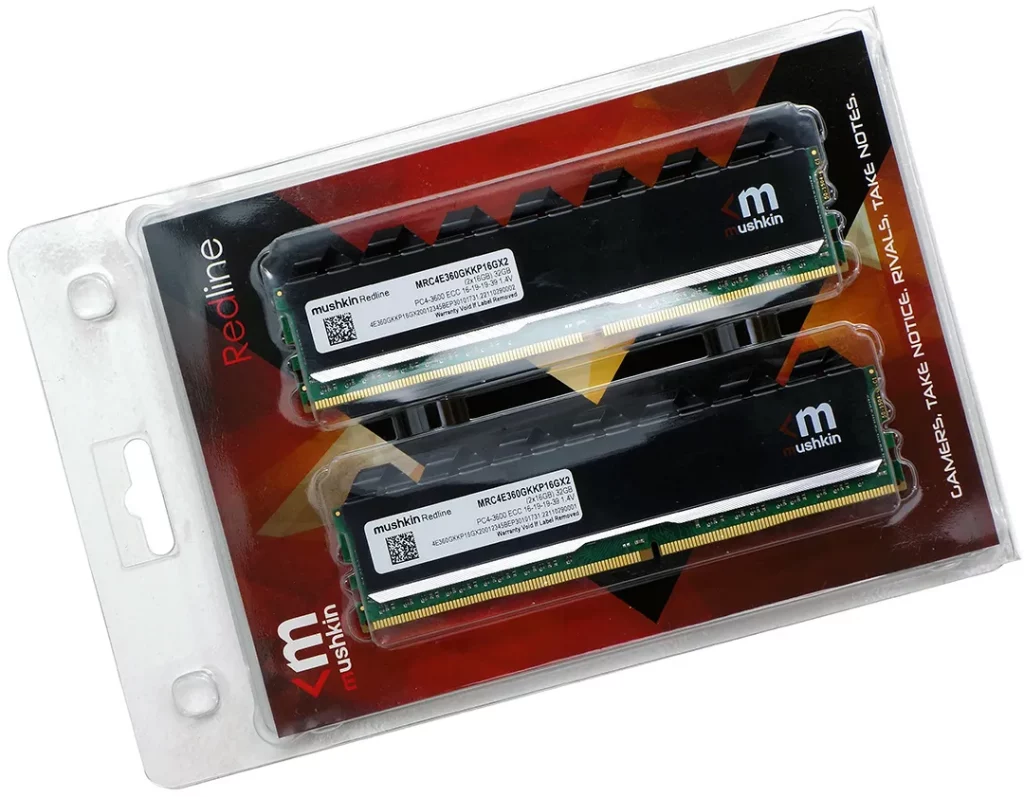
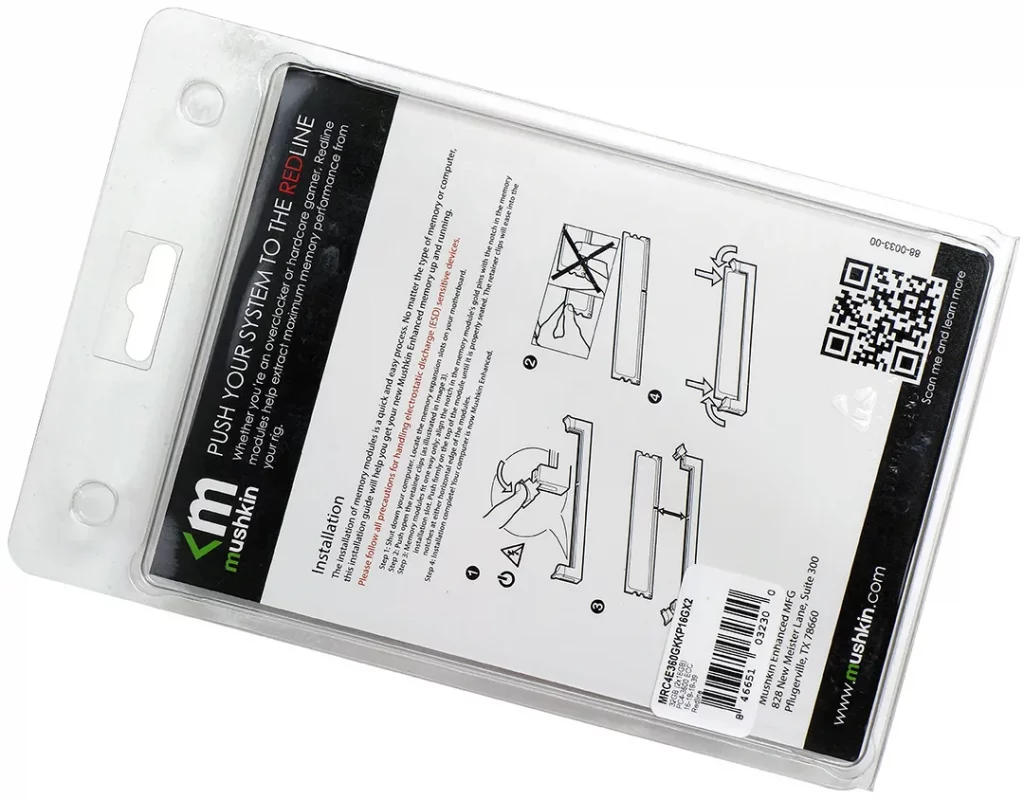
Get it at Amazon

(click for availability)
Owing to its inclusion of a mere two DIMMs at an AM4-promoted data rate, Mushkin’s Redline Frostbyte part number MRC4E360GKKP16GX2 DDR4-3600 64GB kit appears targeted specifically toward these users: While most TRX40 boards support the same data rate, the desire to fill four channels would lead buyers toward a different, four-module part number that Mushkin does not yet offer. With a fastest non-XMP configuration of DDR4-2666 CAS 19, our board picked DDR4-2666 CAS 20 until we enabled XMP’s automatic overclock.
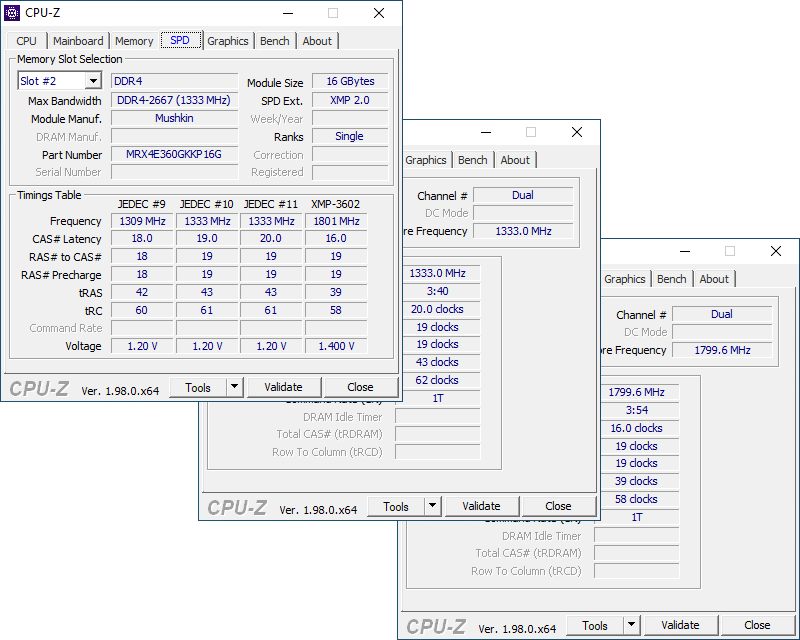
Since higher frequencies make clock cycles quicker, the resulting DDR4-3600 XMP’s 16-19-19-39 timings appear doubly quick compared to JEDEC’s top DDR4-3200 CAS 22 standard. The RAM requires 1.40V to get there though, which means it will likely appeal only to high-market end users.
ECC At DDR4-3200 C14: Quick And Compatible
AMD’s official specs for Ryzen Threadripper processors stop at DDR4-3200, though most reviewers have tested them at far higher data rates. There will be people who don’t want to go past AMD’s official recommendation, but those people will probably be looking for at least a four-DIMM kit. Yet as we’ll see later, the performance advantage of CAS 14 might be worth the very slight stability risk of using two of these kits on a single TRX40 motherboard.
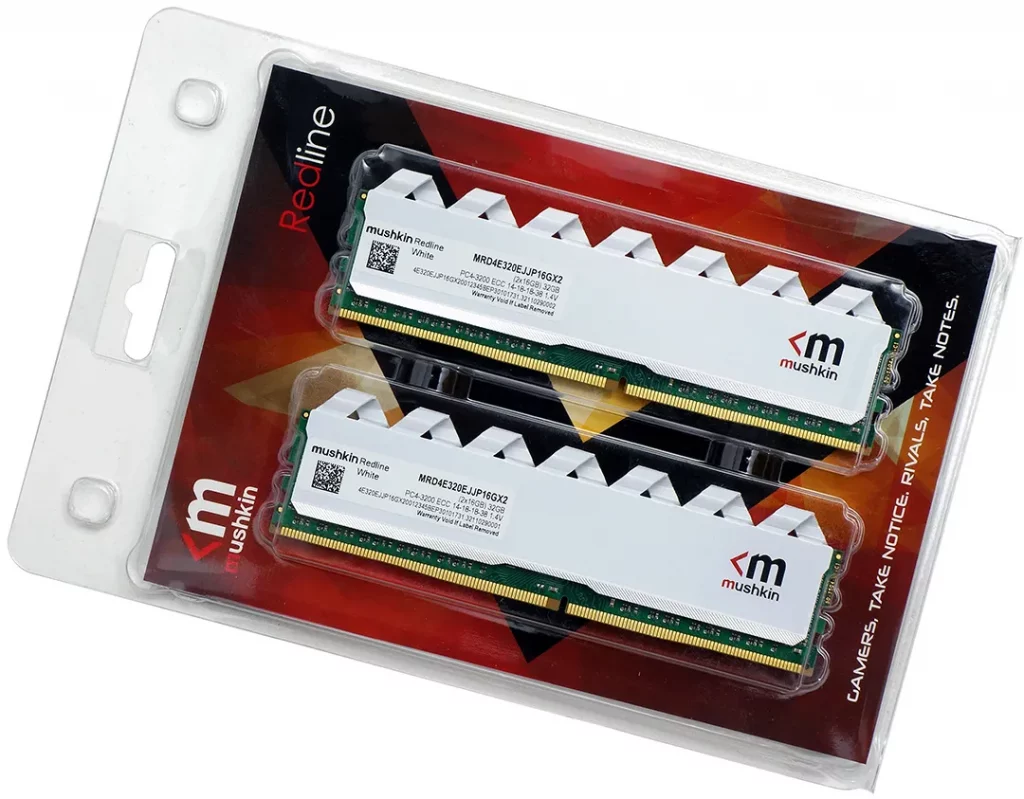
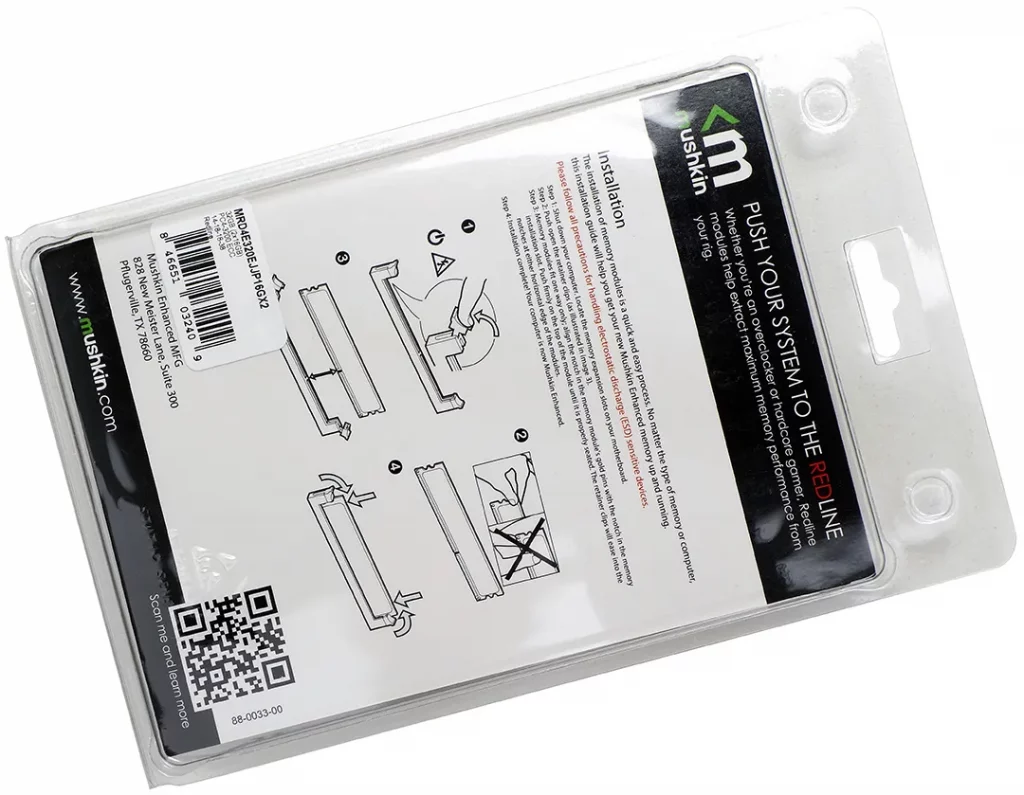
Get it at Amazon

(click for availability)
We’re talking about Mushkin’s part number MRD4E320EJJP16GX2 DDR4-3200 CAS 14 kit, which math says that’s 1.6% quicker than DDR4-3600 CAS 16. The full primary timing set of 14-18-18-38 looks a little less advantageous however, so we’ll have to see how it plays out in our benchmarks. Getting up to full-send requires one to enable XMP, as each module’s non-XMP configuration is DDR4-2666.
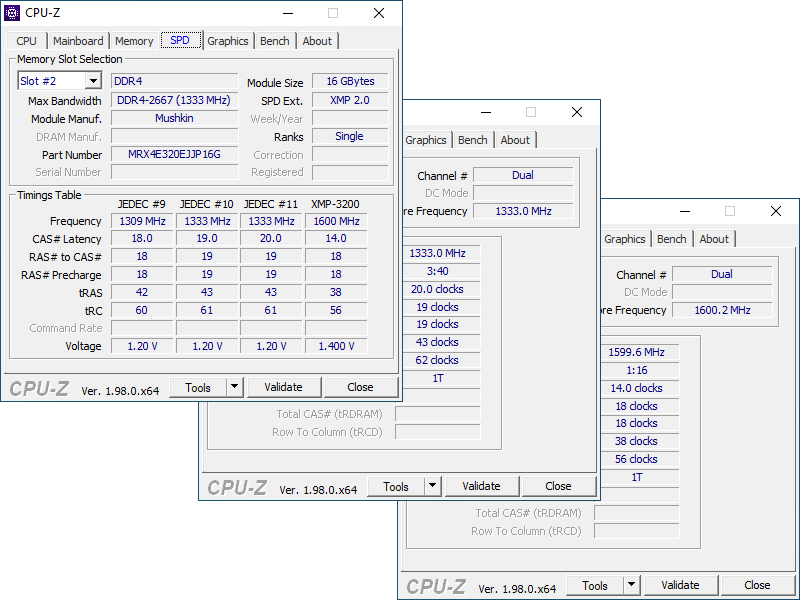
Expanded compatibility for its DDR4-3200 data rate should likewise apply to Intel’s upcoming W680 motherboards, though the relatively-high XMP voltage might dissuade the stodgier Intel market.
All Mushkin DRAM carries a lifetime limited warranty.
Test Hardware
Since one of our AM4 motherboards was listed as non-ECC and the other had a weird CPU requirement, we jumped straight to TRX40, noting that since every test would scale it back to dual-channel mode, at least the benchmark data would be useful within the confines of this review.
| Test Hardware | |
| CPU | AMD Ryzen Threadripper 3970X: 32C/64T, 3.7-4.5 GHz, 128 MB L3 Cache, sTRX4 |
| CPU Cooler | Swiftech SKF TR4 Heirloom, Alphacool VPP655 with Eisbecher D5 150mm, NexXxoS UT60 X-Flow |
| Motherboard | Gigabyte TRX40 Aorus Master: sTRX4, BIOS F4a |
| Graphics | Gigabyte GeForce RTX 2070 Gaming OC 8G: 1410-1725 MHz GPU, GDDR6 |
| Power | be quiet! Dark Power Pro 10 850W: ATX12V v2.3, EPS12V, 80 PLUS Platinum |
| Hard Drive | TOSHIBA OCZ RD400 256GB NVMe 1.1b SSD |
| Sound | Integrated HD Audio |
| Network | Integrated Wi-Fi |
| Graphics Driver | GeForce 496.49 |
We’re including our motherboard’s JEDEC DDR4-3200 timings as an ECC baseline, noting here that it doesn’t matter which ECC kit we used to create that baseline since we used motherboard-programmed timings. But there’s no need to keep secrets: It was the second ECC kit.
| Mushkin Redline Frostbyte 3600-ECC MRC4E360GKKP16GX2 | Mushkin DDR4-3600 MRC4U360GKKP16GX2 | Mushkin Redline Frostbyte 3200-ECC MRD4E320EJJP16GX2 | JEDEC DDR4-3200 ECC | |
| Capacity | 32 GB (2x 16GB) | 32 GB (2x 16GB) | 32 GB (2x 16GB) | 32 GB (2x 16GB) |
| Data Rate | DDR4-3200 (XMP) | DDR4-3200 (XMP) | DDR4-3200 (XMP) | DDR4-3200 (XMP) |
| Primary Timings | 16-19-19-39 (1T) | 16-19-19-39 (1T) | 14-18-18-38 (1T) | 22-22-22-52 (2T) |
| Voltage | 1.40 Volts | 1.40 Volts | 1.35 Volts | 1.20 Volts |
| Warranty | Lifetime | Lifetime | Lifetime | Varies |
With its identical timings, Mushkin’s previously tested DDR4-3600 kit stands to show us whether ECC really slows a modern system. This is where we squeeze all three kits to see if lower timings are possible.
|
Lowest Stable Timings at 1.45V (Max) on Gigabyte TRX40 Aorus Master |
|||
|
Mushkin Redline |
Mushkin DDR4-3600 |
Mushkin Redline |
|
|
DDR4-3600 |
15-17-17-34 (1T) |
15-17-17-34 (1T) |
15-17-17-34 (1T) |
|
DDR4-3200 |
14-16-16-32 (1T) |
13-15-15-30 (1T) |
13-15-15-30 (1T) |
Though all three kits reached CAS 15 at DDR4-3600, the 3600-ECC couldn’t match the low timings of the other two kits when clocked down to DDR4-3200. And since latency is a measure of response time, lower is better (quicker).

The odd part is that the same two kits that achieved the lowest DDR4-3200 latencies also reached the highest clocks after loosening timing to CAS 22. The point of choosing CAS 22 when overclocking was to allow every kit to reach DDR4-4400.
Performance
Sandra Memory Bandwidth shows the odd result of the DDR4-3200 ECC reaching the highest bandwidth across all settings. This could be a Threadripper-specific phenomena, or a peculiarity of the motherboard, or a result of how latency impacts Sandra Bandwidth. AIDA64 results were closer to expectations, but the DDR4-3200 ECC kit performed better than the DDR4-3600 kits after being overclocked to DDR4-3600.


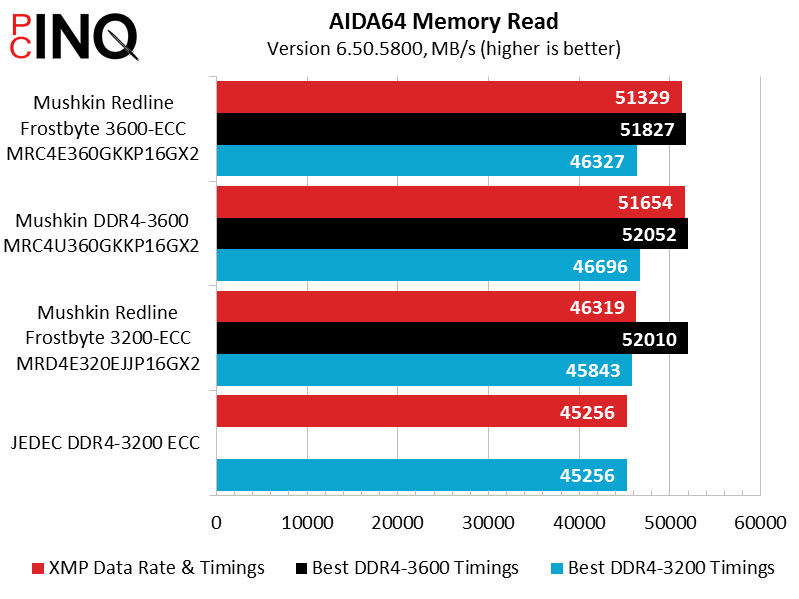
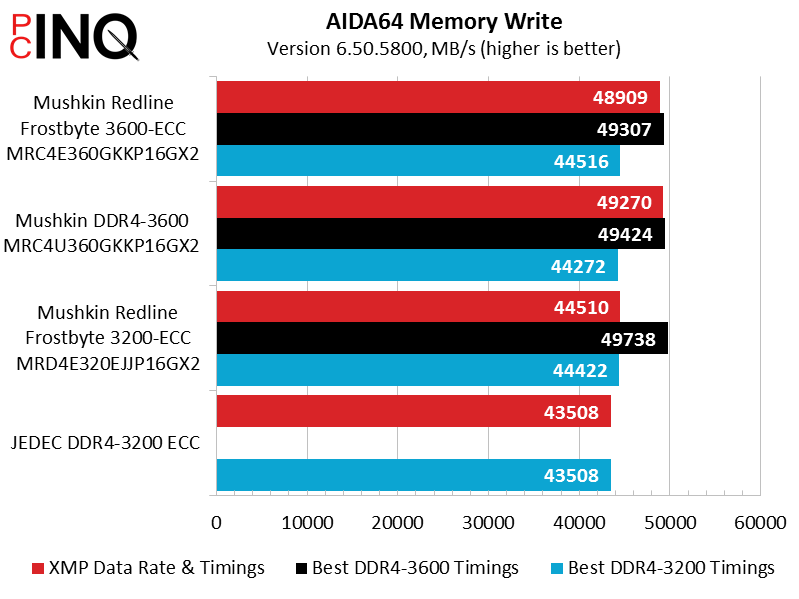
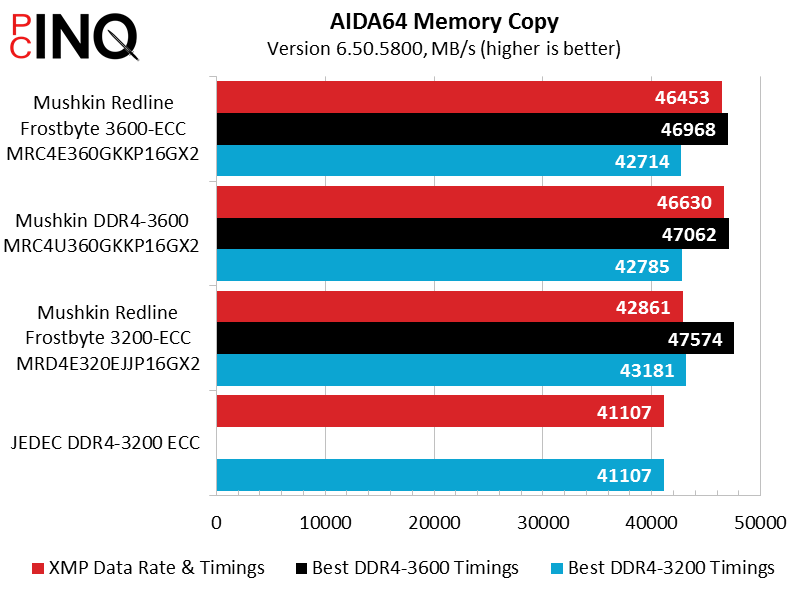
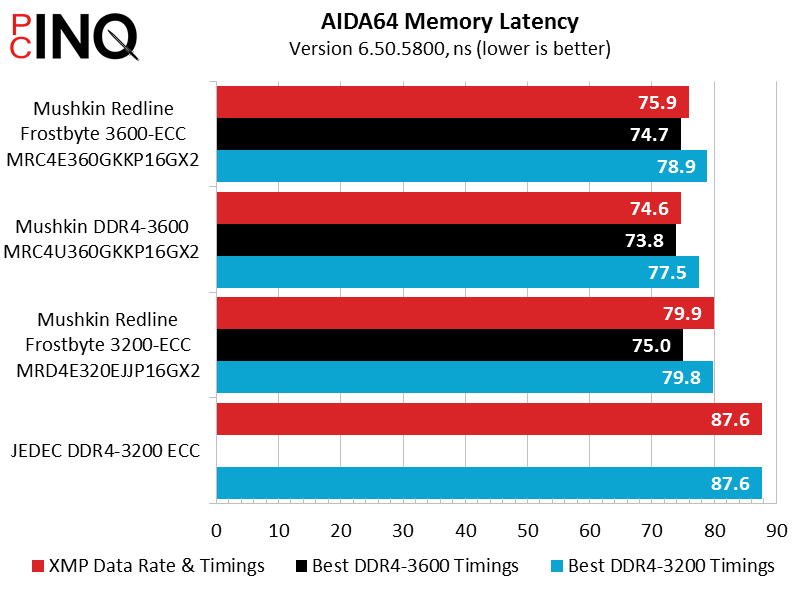
F1 2021 appears to show a bottleneck other than DRAM, and our best guess would be that this bottleneck has something to do with our 32-core processor’s relatively low clock speed. 7-Zip gets weird too, with the overclocked DDR4-3200 performing far better than either of the DDR4-3600 kits.
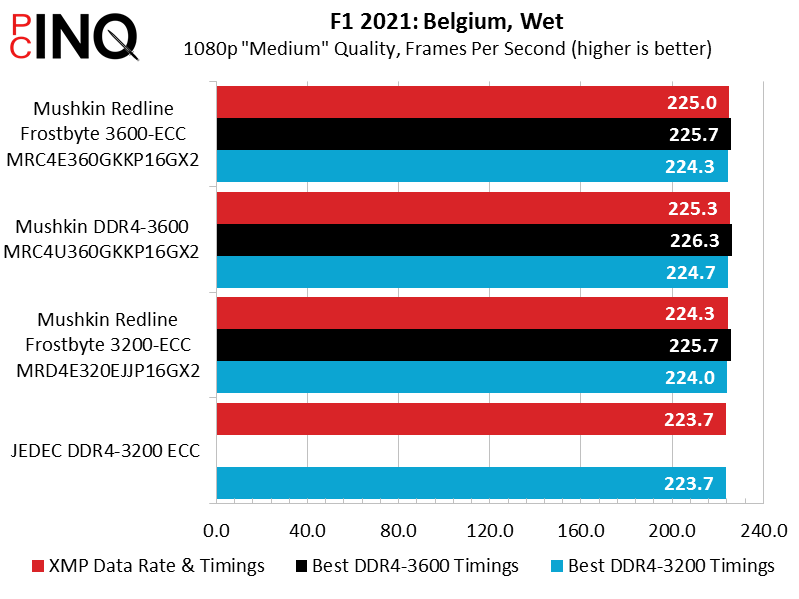
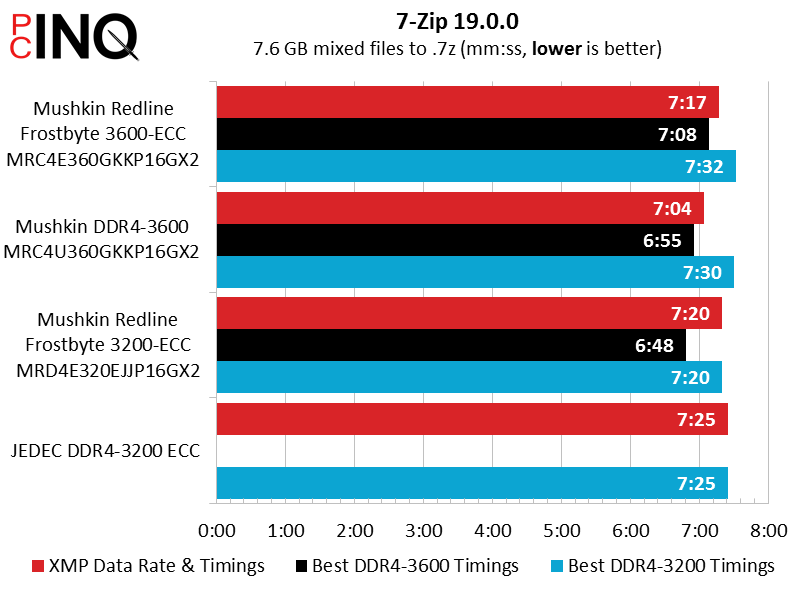
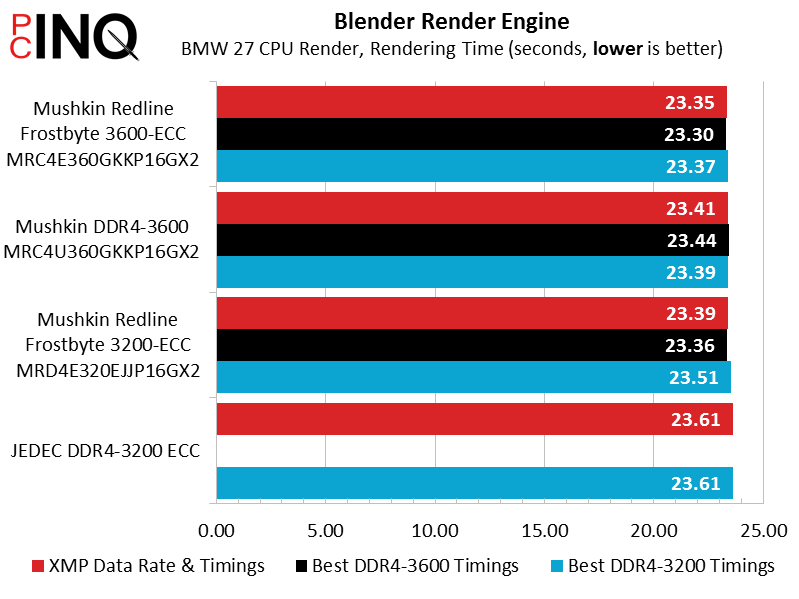
Conclusion
We had previously heard that modern processors with integrated memory controllers are barely slowed by ECC calculations, and our own test didn’t reveal any significant performance disadvantage to using ECC, so why not give yourself a little insurance against corrupt data? Price?
Current lists appear speculative with the ECC version of Mushkin’s memory around $100 costlier than non-ECC…in Europe…after taxes. We think that many end users who do serious work from their PCs would likely pay up to $60 for the added protection ECC offers, and we could easily recommend either of these kits as an AM4 solution if priced that way.
|
Pros: |
Cons: |
|
|
|
The Verdict: |
|
|
ECC seems like cheap insurance against errant calculations for those who complete productivity tasks at home, but without a current US price we can’t examine exactly how cheap that insurance is. Mushkin is first to offer the feature in enhanced-performance memory kits, and all we can do is hope that it follows our pricing guidance. |
|
The first memory products to respond to the performance expectations and data integrity needs of work-from-home computing professionals, Mushkin’s XMP DDR4 ECC kits receives our award for its innovation.

